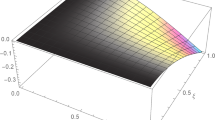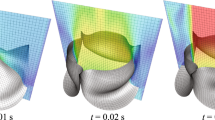Abstract
In this paper, we introduce a general multilevel gradient Uzawa algorithm for symmetric saddle point systems. We compare its performance with the performance of the standard Uzawa multilevel algorithm. The main idea of the approach is to combine a double inexact Uzawa algorithm at the continuous level with a gradient type algorithm at the discrete level. The algorithm is based on the existence of a priori multilevel sequences of nested approximation pairs of spaces, but the family does not have to be stable. To ensure convergence, the process has to maintain an accurate representation of the residuals at each step of the inexact Uzawa algorithm at the continuous level. The residual representations at each step are approximated by projections or representation operators. Sufficient conditions for ending the iteration on a current pair of discrete spaces are determined by computing simple indicators that involve consecutive iterations. When compared with the standard Uzawa multilevel algorithm, our proposed algorithm has the advantages of automatically selecting the relaxation parameter, lowering the number of iterations on each level, and improving on running time. By carefully choosing the discrete spaces and the projection operators, the error for the second component of the solution can be significantly improved even when comparison is made with the discretization on standard families of stable pairs.
Similar content being viewed by others
References
Arrow, K., Hurwicz, L., Uzawa, H.: Studies in Nonlinear Programming. Stanford University Press, Stanford (1958)
Aziz, A., Babuška, I.: Survey lectures on mathematical foundations of the finite element method. In: Aziz, A. (ed.) The Mathematical Foundations of the Finite Element Method with Applications to Partial Differential Equations, pp. 1–362. Academic Press, New York (1972)
Bacuta, C.: A unified approach for uzawa algorithms. SIAM J. Numer. Anal. 44(6), 2245–2649 (2006)
Bacuta, C.: Schur complements on hilbert spaces and saddle point systems. J. Comput. Appl. Math. 225(2), 581–593 (2009)
Bacuta, C.: Subspace interpolation with applications to elliptic regularity. Numer. Funct. Anal. Optim. 29(1–2), 88–114 (2008)
Bacuta, C., Bramble, J.H., Pasciak, J.: Using finite element tools in proving shift theorems for elliptic boundary value problems. Numer. Linear Algebra Appl. 10(1–2), 33–64 (2003)
Bacuta, C., Bramble, J.H., Pasciak, J.: Shift theorems for the biharmonic Dirichlet problem. In: Proceedings for the CAPDE Conference, Recent Progress in Computational and Applied PDEs. Kluwer Academic/Plenum Publishers, Zhangjiajie (2001)
Bacuta, C., Bramble, J.H., Xu, J.: Regularity estimates for elliptic boundary value problems in Besov spaces. Math. Comput. 72, 1577–1595 (2003)
Bacuta, C., Bramble, J.H., Xu, J.: Regularity estimates for elliptic boundary value problems with smooth data on polygonal domains. J. Numer. Math. 11(2), 75–94 (2003)
Bacuta, C., Mazzucato, A., Nistor, V., Zikatanov, L.: Interface and mixed boundary value problems on $n$-dimensional polyhedral domains. Doc. Math. 15, 687–745 (2010)
Bacuta, C., Monk, P.: Multilevel discretization of symmetric saddle point systems without the discrete LBB condition. Appl. Numer. Math. 62(6), 667–681 (2012)
Bacuta, C., Nistor, V., Zikatanov, L.: Improving the rate of convergence of ‘high order finite elements’ on polyhedra I: apriori estimates: mesh refinements and interpolation, with V. Nistor and L. Zikatanov. Numer. Funct. Anal. Optim. 26(6), 613–639 (2005)
Bansch, E., Morin, P., Nochetto, R.H.: An adaptive Uzawa FEM for the Stokes problem: convergence without the inf–sup condition. Siam J. Numer. Anal. 40, 1207–1229 (2002)
Benzi, M., Golub, G.H., Liesen, J.: Numerical solutions of saddle point problems. Acta Numer. 14, 1–137 (2005)
Bornemann, F.A., Deuhard, P.: The cascadic multigrid method for elliptic problems. Numer. Math. 75, 135–152 (1996)
Braess, D.: Finite Elements. Springer, New York (1992)
Braess, D., Dahmen, W.: A cascadic multigrid algorithm for the Stokes problem. Numer. Math. 82, 179–191 (1999)
Braess, D., Dahmen, W.: A cascadic multigrid algorithm for the Stokes equations. Numer. Math. 82(2), 179–191 (1999)
Braess, D., Sarazin, R.: An efficient smoother for the Stokes problem. Appl. Numer. Math. 23(1), 3–19 (1997)
Bramble, J.H., Pasciak, J.E.: A new approximation technique for div-curl systems. Math. Comput. 73, 1739–1762 (2004)
Bramble, J.H., Pasciak, J.E., Kolev, T.: A least-squares method for the time-harmonic Maxwell equations. J. Numer. Math. 13, 237–320 (2005)
Bramble, J.H., Pasciak, J.E., Vassilevski, P.S.: Computational scales of Sobolev norms with application to preconditioning. Math. Comput. 69, 463–480 (2000)
Bramble, J.H., Pasciak, J., Vassilev, A.T.: Analysis of the inexact Uzawa algorithm for saddle point problems. Siam J. Numer. Anal. 34, 1072–1092 (1997)
Bramble, J.H., Zhang, X.: The analysis of multigrid methods. In: Ciarlet, P., Lions, J.L. (eds.) Handbook for Numerical Analysis, vol. VII, pp. 173–415. North Holland, Amsterdam (2000)
Brenner, S., Scott, L.R.: The Mathematical Theory of Finite Element Methods. Springer, New York (1994)
Brezzi, F., Fortin, M.: Mixed and Hybrid Finite Element Methods. Springer, New York (1991)
Brezzi, F.: On the existence, uniqueness and approximation of saddle-point problems arising from Lagrangian multipliers. RAIRO Anal. Numer. 8(R-2), 129–151 (1974)
Dahlke, S., Dahmen, W., Urban, K.: Adaptive wavelet methods for saddle point problems: optimal convergence rates. Siam J. Numer. Anal. 40, 1230–1262 (2002)
Dauge, M.: Elliptic Boundary Value Problems on Corner Domains. Lecture Notes in Mathematics 1341. Springer, Berlin (1988)
Elman, H.C., Golub, G.H.: Inexact and preconditioned Uzawa algorithms for saddle point problems. Siam J. Numer. Anal. 31, 1645–1661 (1994)
Elman, H.C., Silvester, D., Wathen, A.: Finite Elements and Fast Iterative Solvers. Oxford Science Publications, Oxford (2005)
Fortin M., Glowinski R.: Augmented Lagrangian methods: applications to the numerical solutions of boundary value problems. In: Studies in Mathematics and Applications, vol. 15. North-Holland, Amsterdam (1983)
Girault, V., Raviart, P.A.: Finite Element Methods for Navier-Stokes Equations. Springer, Berlin (1986)
Grisvard, P.: Singularities in Boundary Value Problems. Masson, Paris (1992)
Kellogg, R.B.: Interpolation between subspaces of a Hilbert space. Technical note BN-719. Institute for Fluid Dynamics and Applied Mathematics, University of Maryland, College Park (1971)
Kondratyuk, Y., Stevenson, R.: An optimal adaptive finite element method for the Stokes problem. SIAM J. Numer. Anal. 46, 746–775 (2008)
Morin, P., Nochetto, R.H., Siebert, G.: Data oscillation and convergence of adaptive FEM. SIAM J. Numer. Anal. 38(2), 466–488 (2000)
Nochetto, R.H., Pyo, J.: Optimal relaxation parameter for the Uzawa method. Numer. Math. 98, 695–702 (2004)
Quarteroni, A., Valli, A.: Numerical Approximation of Partial Differential Equations. Springer, Berlin (1994)
Sayas, F.J.: Infimum–supremum. Bol. Soc. Esp. Mat. Apl. 41, 19–40 (2007)
Verfürth, R.R.: A Review of A Posterirori Error Estimation and Adaptive Mesh-Refinement Techniques. Wiley-Teubner, Chichester (1996)
Xu, J., Zikatanov, L.: Some observations on Babuška and Brezzi theories. Numer. Math. 94(1), 195–202 (2003)
Acknowledgments
This work was partially supported by NSF, DMS-0713125.
Author information
Authors and Affiliations
Corresponding author
Rights and permissions
About this article
Cite this article
Bacuta, C., Shu, L. Multilevel Gradient Uzawa Algorithms for Symmetric Saddle Point Problems. J Sci Comput 57, 105–123 (2013). https://doi.org/10.1007/s10915-013-9697-9
Received:
Revised:
Accepted:
Published:
Issue Date:
DOI: https://doi.org/10.1007/s10915-013-9697-9




